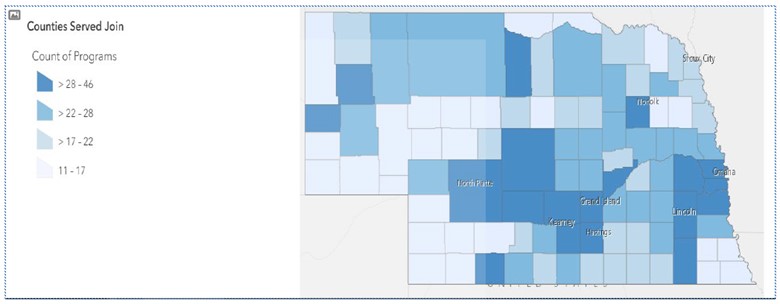American Rescue Plan Act Awards Program at BHECN
Program Overview
In 2022, the Nebraska Legislature passed LB1014, which allocated American Rescue Plan Act (ARPA) funding to various entities across Nebraska. The University of Nebraska Medical Center’s (UNMC) Behavioral Health Education Center of Nebraska (BHECN) was allocated $25.5 million to address the shortage of behavioral health professionals, initiating the BHECN ARPA Awards Program.
This funding was disbursed in 2022-2023 through a competitive request for proposal (RFP) process according to the four areas of need outlined in LB1014: 1) behavioral health training opportunities, 2) telebehavioral health expansion in rural areas, 3) funding for workforce projects related to the COVID-19 pandemic, and 4) funding for the supervision of provisionally licensed providers. Any organization and/or provider in Nebraska was eligible to apply, and awards were allocated until funding was expended.
Project Breakdown
This table examines the breakdown of BHECN ARPA awards by category.
| Award Category | No. of Projects | Amount Funded |
| Behavioral Health Training and Education Opportunities | 38 | $11,750,297.33 |
| Telebehavioral Health Support in Rural Areas | 19 | $6,972,984.03 |
| Workforce projects related to the COVID-19 pandemic | 31 | $2,260,595.00 |
| Funding for Supervision of Provisionally Licensed Providers | 22 | $1,838,331.53 |
| Total | 110 | $22,772,207.89 |
Sixty-seven unique organizations received funding; some were awarded funding for multiple projects across award categories. While organizations in 20 Nebraska counties received funding, all 93 counties are served by at least one BHECN ARPA Awards Program project. Funding was distributed equally among organizations in rural and urban areas of the state.
BHECN ARPA Awards Program Accomplishments
The BHECN ARPA Awards Program team completes an annual evaluation for each project. Baseline survey findings indicate that the Behavioral Health Training and Education projects will support at least 117 new trainees. The Funding for Supervision of Provisionally Licensed Providers projects will add 25 new supervisors across Nebraska, enabling at least 31 additional provisionally licensed providers to be supervised. The Telebehavioral Health Support in Rural Areas project awardees report that the BHECN ARPA Awards Program funding will allow them to address technology and infrastructure barriers that have previously limited telebehavioral health services in their organizations and communities. The Workforce Behavioral Health Impacts of COVID-19 project awardees report that BHECN ARPA projects will enable them to conduct new research and implement training, recruitment, and retention programs that will support the behavioral health workforce.
